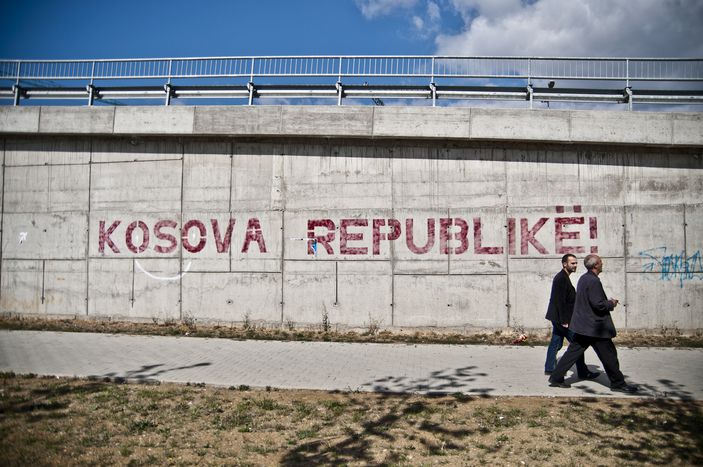
Kosovo Independence – One Year On
Published on
As Kosovo turns one, its UK ambassador assesses the year gone by and the challenges ahead, seeing huge progress achieved and a cause for hope for the future.
(Article of statehood - Kosovo's new flag. Image: Peter Casier/Flickr) First Anniversary of Declaration of Independence
On Tuesday 16 February 2009, Kosovo celebrated its first birthday as an independent state.
One year on after its self declared independence from Serbia, Kosovo has adopted a constitution and is now governed by the majority ethnic Albanian government, after nine years of being administered by the United Nations. Fears of an outbreak of serious violence and floods of minority Serb Kosovans fleeing their homes did not materialise.
However, the new independent state faces a number of significant challenges, as noted by much of the UK media (Guardian | FT | BBC | Independent)
The government is still largely dependent on the international community and the EU, NATO and UN missions there. Serbia maintains its stiff opposition, and has launched a diplomatic offensive, blocking any attempt by Kosovo to join international organisations and referring the matter to the UN’s International Court of Justice.
Whilst Kosovo has received the backing of the US and the majority of EU member states, only 54/192 UN countries have so far recognised the state’s independence, and the UN Security Council remains divided, Russia backing Serbia. Furthermore, the non recognition by 5 EU member states (Spain, Greece, Romania, Slovakia and Cyprus), makes its desired path towards EU membership so what problematic.
Meanwhile, the state of the economy is dire, with 45% unemployment, poor infrastructure and corruption.
In London, Kosovo’s Ambassador in the UK, Dr Muhamet Hamiti, gave his assessment of the situation of the past year and the challenges of the future at an event at the London School of Economics, taking place a day after the first anniversary.
Appointed as Kosovo’s first ambassador to the UK in August 2008, Dr. Hamiti is a former presidential advisor to the late President of Kosova, Dr Ibrahim Rugova, and Rugova’s successor and current President, Dr Fatmir Sejdiu. An academic by training, he is also an independent scholar of English literature at the University of East Anglia and at Birkbeck College (University of London).
"Huge progress" made since independence
Placing Kosovo’s declaration of independence in a historical context, Ambassador Hamiti outlined Kosovo’s struggle for independence after four centuries of Serbian domination. He went on to sum up Kosovo’s achievements over the past 12 months, making “huge progress” since independence: the establishment of democratic institutions and the adoption of a constitution; the drafting of legislation according to EU norms; and the creation of a police force and a lightly armed force, trained by NATO.
Looking to the future, Dr. Hamiti also saw "a lot of challenges" ahead, noting that Kosovo’s independence was very much “supervised independence” in accordance to the Martti Ahtisaari plan – the EU taking on greater role recently with its “EULEX” police and rule of law mission.
On the economy, he believed that Kosovo’s declaration of independence brought much needed clarity, after twenty years of disinvestment and nine years of uncertainty over its final status. Whilst the current global recession is likely to have a negative impact, Kosovo did receive 1.2 billion euros at the international donors conference last July. Furthermore, Kosovo’s 5% annual growth (albeit from a very low base) and entrepreneurial spirit gave also cause for hope for the future.
On the challenges posed by Serbia and its diplomatic efforts to undermine Kosovo’s independence, like its referral of Kosovo to the ICJ, Ambassador Hamiti saw the Serbian government as trying to portray (unjustly) Serbia as an aggrieved party.
Later on, in the question and answer session, Dr. Hamiti went on to say that the current Serbian government’s policies towards Kosovo did not differentiate much from those of Milosovic’s regime, and he believed EU governments would soon realise this.
Process of recognition to continue
Arguing that Kosovo had been widely accepted as a ‘sui generis’ case – Britain, USA and France leading the way by recognising Kosovo’s declaration of independence within 24 hours - he expected other countries to join the 54 that had already done so. He also maintained that Kosovo will become a full member of the international community, indicating that Kosovo intended to apply to join the UN and other international organisations in 2009, and is committed to joining the EU and NATO.
Responding to questions from the audience on the problem of recognition, Ambassador Hamiti argued that countries with concerns for territorial cohesion, like Spain and China, should treat Kosovo as a "strategic issue". He asserted that by recognising Kosovo’s declaration of independence, they would also be recognising Kosovo as a ‘sui generis’ and not as an example for separatists.
Hamiti noted that Kosovo planned to open a further dozen embassies in Europe and around the world during the course of 2009, as a part of Kosovo’s of its diplomatic effort to gain further recognition.
Related articles
(Analysis) Kosovo declared independence one year ago. Is the region really destabilised? By Mira Galanova - cafébabel



